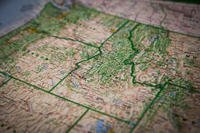Your paycheck this week is going to be bigger, and what you do with that extra money can improve your finances for years to come.
The next regular military payday is Friday, Jan. 14, 2022, with many military members having access to their money earlier if they use a bank or credit union that offers early crediting of military pay. This paycheck will include two or more increases to your total paycheck.
End of the Payroll Tax Deferral
Most military service members had a deduction out of every 2021 paycheck to repay the payroll taxes that were not collected from September to December 2020 due to President Trump’s executive order. If you were on active duty for the entire year of 2021, you will have paid that entire amount, so that deduction no longer will be coming out of your pay each month.
The payroll tax that was deferred was 6.2% of base pay, times four months, for a total of 24.8% of a month's base pay. That amount was repaid over 12 months. Because of annual cost-of-living pay increases, promotions and time-in-grade increases, everyone's exact amount will vary, but the repayment was at roughly 2% of base pay per month.
Annual Cost-of-Living Adjustment
Every military service member will receive a 2.7% increase in their base pay in 2022. This increase will be reflected on the Jan. 14 paycheck.
This is a good place to point out that mid-month pay is half of what the Defense Finance Accounting Service, or DFAS, estimates your full month's pay will be. Sometimes those estimates are more accurate than other times, so you won't know exactly how much your mid-month pay will be until your net pay advice is released.
Basic Allowance for Housing Increases
Based upon location, rank and dependency status, you may be receiving more BAH in 2022. Hundreds of combinations received increases, with an average overall increase of 5.1%. Don't worry if your local area BAH rate has dropped, though. BAH rate protection means that you won't get less money unless you move, get demoted or have a change in dependency status.
Smart Things to Do with This Money
As with any increase in income or windfall, there are three main things you can do to make this money work for you:
- Build an emergency fund: Everyone needs an emergency fund, even military members. Yes, your pay is likely to turn up on time, but things do happen: car repairs, DFAS errors, emergency travel home, etc.
- Pay down debt: Reducing your debt decreases the amount of interest you'll pay, and having lower payments gives you more financial flexibility every month. Prioritize high-interest debt like credit cards and personal loans, then consider whether it makes sense to pay off lower-interest debts like mortgages and most car loans.
- Save and invest: There are several layers of savings and investing, and they are all important. Short-term savings can make your current life easier; longer-term savings help you reach your goals.
Short-term savings for future purchases can change your financial life. Most people think of things like cars and trips, but the options are almost limitless. You can save for football tickets, home improvements, technology, health-care expenses -- really, anything.
Not only does saving help reduce the need to use debt to make purchases; it also reduces stress when unexpected things happen. Kid breaks their glasses? No problem, there's money in the health-care account to replace them. Flat tire? The biggest question is where to buy the replacement. The freedom of being financially prepared for daily life is amazing.
Longer-term savings also might include cars and trips, depending on your timeline, but it may include things like college savings, a military transition fund or a down payment account. List how much you will need, when you will need it and do the math to figure out how to get there.
Investments are things that grow for future use. Use tax-advantaged accounts, like the Thrift Savings Plan and IRAs, to grow your retirement funds. Taxable accounts can have a place in your overall plan, too.
You've probably heard these three steps many times and wondered how you would accomplish them. The new year, with a larger paycheck, is the perfect time to turn your plans into action. Take a minute today to set up automatic transfers or allotments to build an emergency fund, pay off debt and increase your savings and investing. You won't notice the money being diverted, and you'll move toward long-term financial stability.
















